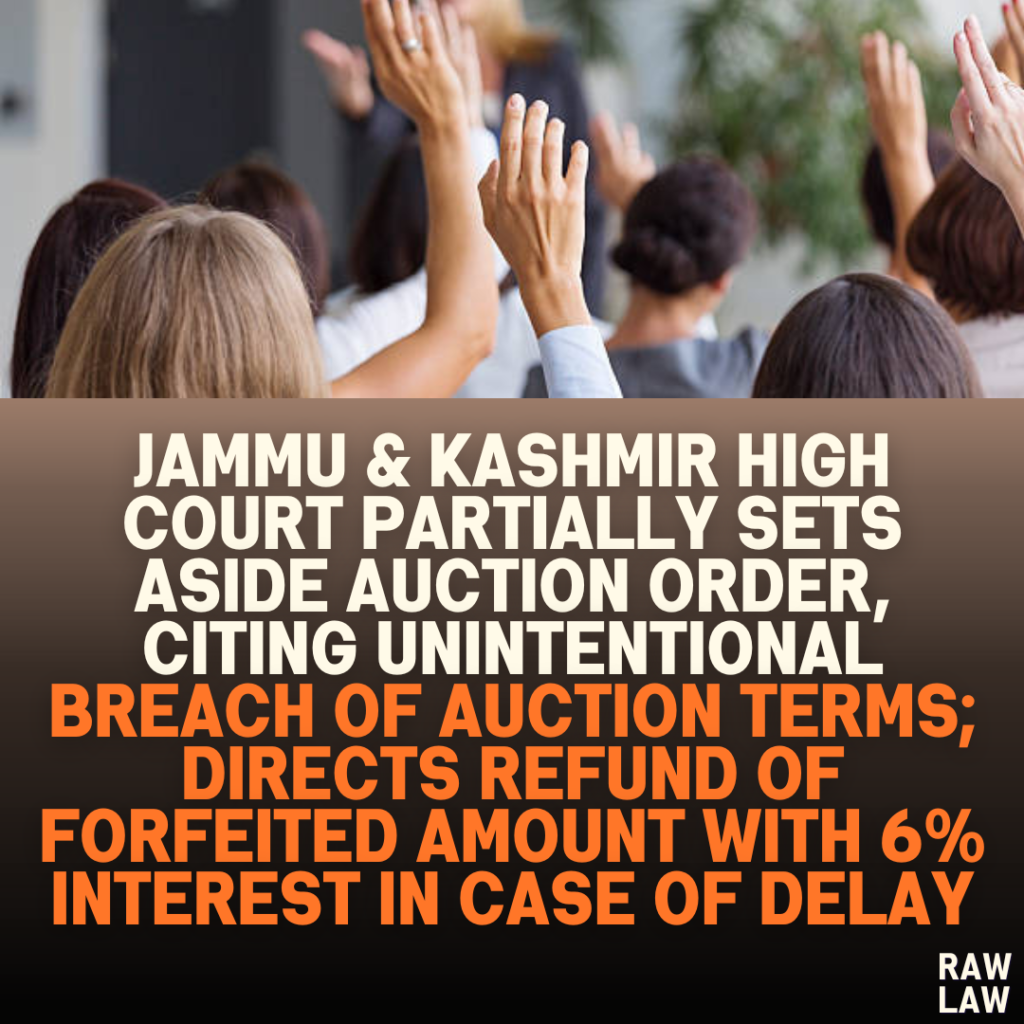Court’s Decision:
The High Court of Jammu & Kashmir and Ladakh at Jammu, presided over by Justice Puneet Gupta, partially set aside the order canceling the petitioner’s bid for a liquor license. The court ruled that while there was a violation of auction terms, the petitioner had not willfully breached the conditions, and therefore the amount deposited should be returned. The court directed the respondents to refund the petitioner within one month, with a 6% per annum interest rate applicable in case of delay.
Facts:
The petitioner, having successfully bid for a liquor license in Ward No. 19 (North of Tawi), Jammu, was later disqualified by the authorities for violating Clause 13 of the re-auction notice dated 23.05.2022. This clause required that the bid amount be deposited from the bidder’s own bank account. The petitioner had made the deposit from another person’s account, leading to the cancellation of her bid and forfeiture of the amount deposited.
Issues:
The primary issue was whether the petitioner’s violation of Clause 13 of the re-auction notice justified the forfeiture of the bid amount and the denial of the liquor license.
Petitioner’s Arguments:
The petitioner argued that the condition to deposit the bid amount from the bidder’s own account, as per Clause 13, was an ancillary clause and not part of the basic excise policy or the original auction notice. Furthermore, it was contended that there was no deliberate or willful violation of the terms, and the amount deposited should not be forfeited.
Respondent’s Arguments:
The respondents maintained that the petitioner had violated Clause 13 of the re-auction notice, which was meant to prevent cartelization of bids. Since the petitioner was fully aware of this condition, the respondents argued that they were justified in canceling the bid and withholding the deposited amount.
Analysis of the Law:
The court acknowledged that Clause 13 was part of the re-auction notice and had a specific purpose in regulating the auction process. While this clause was not part of the original excise policy or first auction notice, it was still a valid and enforceable condition under the re-auction terms.
Precedent Analysis:
The petitioner cited the 1991 Supreme Court decision in Poddar Steel Corporation v. Ganesh Engineering Works to argue that the violation of an ancillary clause should not result in forfeiture of the bid. The court, however, found that while the clause had its importance, the petitioner had not willfully violated it.
Court’s Reasoning:
The court reasoned that the petitioner’s breach of Clause 13 was not a willful attempt to circumvent the auction process. Although the respondents were within their rights to cancel the bid, it would be unjust for them to withhold the amount deposited by the petitioner. The court emphasized that as a welfare state, the respondents should not seek to enrich themselves at the expense of a bidder who had made an unintentional error.
Conclusion:
The court partially set aside the impugned order and allowed the petition. The respondents were directed to refund the amount deposited by the petitioner within one month. In the event of default, the respondents were ordered to pay interest at the rate of 6% per annum on the due amount from the date of the court’s order.
Implications:
The judgment reinforces the principle that violations of ancillary conditions in public auctions may not automatically result in forfeiture, especially in cases where there is no deliberate wrongdoing. The decision also underscores the duty of the state to act fairly and in the best interest of justice, particularly in situations involving inadvertent mistakes by bidders.




Pingback: Orissa High Court Rules Acquittal and Later Disclosure Mitigate Grounds for Rejection in Fireman Appointment; Suppression of Criminal Background Not a Bar to Disqualification - Raw Law
Pingback: Gauhati High Court Holds FCI Cannot Unilaterally Deduct Demurrage Charges Without Legal Adjudication of Contractor’s Liability or Direct Responsibility for Delays; Orders Refund of Deductions - Raw Law